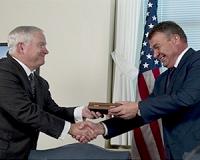| . |  |
. |
Beijing (UPI) Sep 16, 2010 After months of strained relations, U.S. Defense Department officials say they have received encouraging signs in Chinese designs to renew military-to-military relations with the United States ahead of talks between the two countries' presidents early next year. The changing course of relations was revealed after talks between Xu Caihou, vice chairman of China's Central Military Commission, and U.S. deputy national security adviser Thomas E. Donilon. At the end of a three-day visit to Beijing during which both sides seemed to go out of their way to appear cordial in public, officials expressed their desire to keep dialogue open and improve exchanges with the U.S. military. Soon after the meeting, National Security Council spokesman Mike Hammer said in a statement, "The United States seeks to expand cooperation in the many areas where our countries' interests coincide while we will speak frankly and with respect when we disagree." No details of the talks were released from either side, still Hong Kong's South China Morning Post said that officials had "finalized an agreement to work toward restoring military exchanges ahead of a planned visit by Chinese President Hu Jintao to Washington in January." China halted its military-to-military relations with the United States in February in protest of a U.S. arms shipment to Taiwan. China has been pressing the United States to honor its commitments and stop selling arms to Taiwan. Even senior U.S. congressmen have grown worried, saying U.S. arms sales to Taipei could imperil relations with China. Taiwan requested purchase of 66 F-6 fighters in early 2007. Washington, though, has held up the deal, apparently heeding concerns from Beijing. Yet when the United States sanctioned a $6.4 billion arms deal with Taiwan last January, China retaliated by suspending military talks with the United States and repositioning cruise and ballistic missiles opposite Taiwan. The arms deal includes Black Hawk helicopters, mine hunter ships and advanced Patriot missiles, built by Lockheed Martin and Raytheon. U.S. officials have long indicated that the deal would be followed by plans to gauge the design and construction of diesel-powered submarines for the island, which China deems a wayward province. At a news conference, the visiting U.S. official said that Defense Secretary Robert Gates would meet with his Chinese counterpart if invited. Still, the Pentagon Press Secretary Geoff Morrell clarified that such a meeting wouldn't mark "engagement for the sake of engagement." "We are not just looking for a reciprocal visit by Secretary Gates," he added. "What we are looking for is a resumption of productive, transparent, military-to-military engagement so that we can both gain a better understanding of what our ambitions are, what our intentions are how we operate." Washington is required under the Taiwan Relations Act to ensure that Taiwan can defend itself. The United States remains the island's top arms supplier.
Share This Article With Planet Earth
Related Links Learn about the Superpowers of the 21st Century at SpaceWar.com Learn about nuclear weapons doctrine and defense at SpaceWar.com
 US, Russian defense chiefs promote deeper ties
US, Russian defense chiefs promote deeper tiesWashington (AFP) Sept 15, 2010 Defense Secretary Robert Gates on Wednesday hosted his Russian counterpart Anatoly Serdyukov in a high-profile visit symbolizing a "reset" in US-Russia ties. Both men vowed to expand military cooperation as they marked the first visit to the Pentagon by a Russian defense minister in more than five years. The full-day of talks reflected how relations between the former Cold War foes have ... read more |
|
| The content herein, unless otherwise known to be public domain, are Copyright 1995-2010 - SpaceDaily. AFP and UPI Wire Stories are copyright Agence France-Presse and United Press International. ESA Portal Reports are copyright European Space Agency. All NASA sourced material is public domain. Additional copyrights may apply in whole or part to other bona fide parties. Advertising does not imply endorsement,agreement or approval of any opinions, statements or information provided by SpaceDaily on any Web page published or hosted by SpaceDaily. Privacy Statement |